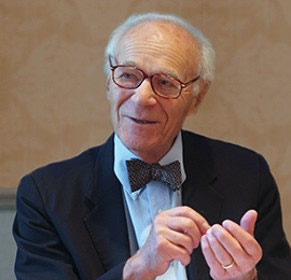Related Research Articles

Lawrence Robert Klein was an American economist. For his work in creating computer models to forecast economic trends in the field of econometrics in the Department of Economics at the University of Pennsylvania, he was awarded the Nobel Memorial Prize in Economic Sciences in 1980 specifically "for the creation of econometric models and their application to the analysis of economic fluctuations and economic policies." Due to his efforts, such models have become widespread among economists. Harvard University professor Martin Feldstein told the Wall Street Journal that Klein "was the first to create the statistical models that embodied Keynesian economics," tools still used by the Federal Reserve Bank and other central banks.

Hal Ronald Varian is Chief Economist at Google and holds the title of emeritus professor at the University of California, Berkeley where he was founding dean of the School of Information. Varian is an economist specializing in microeconomics and information economics.

Randolph Preston McAfee is an American economist and distinguished scientist at Google. Previously, he served as chief economist at Microsoft. He has also served as an economist at Google, vice president and research fellow at Yahoo! Research, where he led the Microeconomics and Social Systems group, and was the J. Stanley Johnson Professor of Business, Economics, and Management at the California Institute of Technology, where he was the executive officer for the social sciences. He has taught business strategy, managerial economics, and introductory microeconomics.
The multinational technology corporation Apple Inc. has been a participant in various legal proceedings and claims since it began operation and, like its competitors and peers, engages in litigation in its normal course of business for a variety of reasons. In particular, Apple is known for and promotes itself as actively and aggressively enforcing its intellectual property interests. From the 1980s to the present, Apple has been plaintiff or defendant in civil actions in the United States and other countries. Some of these actions have determined significant case law for the information technology industry and many have captured the attention of the public and media. Apple's litigation generally involves intellectual property disputes, but the company has also been a party in lawsuits that include antitrust claims, consumer actions, commercial unfair trade practice suits, defamation claims, and corporate espionage, among other matters.

The President's Council of Advisors on Science and Technology (PCAST) is a council, chartered in each administration with a broad mandate to advise the president of the United States on science and technology. The current PCAST was established by Executive Order 13226 on September 30, 2001, by George W. Bush, was re-chartered by Barack Obama's April 21, 2010, Executive Order 13539, by Donald Trump's October 22, 2019, Executive Order 13895, and by Joe Biden's February 1, 2021, Executive Order 14007.

Lee Chia-Tung, also known as Richard C. T. Lee, received his B.Sc. degree from the Department of Electrical Engineering of National Taiwan University and Ph.D. degree from the Department of Electrical Engineering and Computer Science from University of California, Berkeley.
The Columbia Institute for Tele-Information (CITI) is one of several research centers for Columbia Business School, focusing on strategy, management, and policy issues in telecommunications, computing, and electronic mass media. It aims to address the large and dynamic telecommunications and media industry that has expanded horizontally and vertically drive by technology, entrepreneurship and policy.
George Peter Lyman was an American professor of information science who taught at the University of California, Berkeley School of Information, and was well known in U.S. academia for his research on online information and his leadership in remaking university library systems for the digital era.

Michael Ralph Stonebraker is an American computer scientist specializing in database systems. Through a series of academic prototypes and commercial startups, Stonebraker's research and products are central to many relational databases. He is also the founder of many database companies, including Ingres Corporation, Illustra, Paradigm4, StreamBase Systems, Tamr, Vertica and VoltDB, and served as chief technical officer of Informix. For his contributions to database research, Stonebraker received the 2014 Turing Award, often described as "the Nobel Prize for computing."

Nadarajan "Raj" Chetty is an Indian-American economist who is the William A. Ackman Professor of Public Economics at Harvard University. Some of Chetty's recent papers have studied equality of opportunity in the United States and the long-term impact of teachers on students' performance. Offered tenure at the age of 28, Chetty became one of the youngest tenured faculty in the history of Harvard's economics department. He is a recipient of the John Bates Clark Medal and a 2012 MacArthur Fellow. Currently, he is also an advisory editor of the Journal of Public Economics. In 2020, he was awarded the Infosys Prize in Economics, the highest monetary award recognizing achievements in science and research, in India.
Maneesh Agrawala is a professor of computer science at Stanford University. He returned to Stanford in 2015 as the director of the Brown Institute for Media Innovation, after nearly a decade on the faculty at the University of California, Berkeley.
Nicholas Economides is an internationally recognized academic authority on network economics, electronic commerce and public policy. His fields of specialization and research include the economics of networks, especially of telecommunications, computers, and information, the economics of technical compatibility and standardization, industrial organization, the structure and organization of financial markets and payment systems, antitrust, application of public policy to network industries, strategic analysis of markets and law and economics.
Incentive-centered design (ICD) is the science of designing a system or institution according to the alignment of individual and user incentives with the goals of the system. Using incentive-centered design, system designers can observe systematic and predictable tendencies in users in response to motivators to provide or manage incentives to induce a greater amount and more valuable participation. ICD is often considered when designing a system to induce desirable behaviors from users, such as participation and cooperation. It draws from principles in various areas such as economics, psychology, sociology, design, and engineering. ICD has been gaining attention in research communities due to the role it can play in helping systems benefit their users and ultimately achieve better results.
Middle Eastern Americans are Americans of Middle Eastern background. Although once considered Asian Americans, the modern definition of "Asian American" now excludes people with West Asian backgrounds.

Kathryn Mary Elizabeth Dominguez is a Professor of Public Policy and Economics at the University of Michigan and is a former nominee for the Governor of the U.S. Federal Reserve System.

Dan L. Burk was a Chancellor's Professor of Law at the University of California, Irvine School of Law and is a founding member of the law faculty. His areas of expertise included intellectual property, gene patenting, digital copyright, electronic commerce and computer trespass.

Eugene Wong is a Chinese-American computer scientist and mathematician. Wong's career has spanned academia, university administration, government and the private sector. Together with Michael Stonebraker and a group of scientists at IBM, Wong is credited with pioneering database research in the 1970s from which software developed by IBM, Microsoft, and Oracle descends. Wong retired in 1994, since then holding the title of Professor Emeritus of Electrical Engineering and Computer Sciences at University of California, Berkeley.
References
- ↑ "Jeffrey K. MacKie-Mason". ResearchGate . Retrieved October 3, 2019.
- ↑ "STIET". Archived from the original on 17 December 2013. Retrieved 9 February 2014.
- ↑ "IGERT: Incentive-Centered Design for Information and Communication Systems". NSF. Retrieved 9 February 2014.
- ↑ "Google Scholar".
- ↑ "Townsend and Townsend and Crew Announces California Plaintiffs Opposition to Proposed Settlement of Over 100 Microsoft Lawsuits in Preparation for Dec. 10 Hearing". December 6, 2001. Retrieved 9 February 2014.
- ↑ Feder, Barnaby J. (June 11, 2000). "U.S. vs. MICROSOFT: Microsoft at the Razor's Edge; From Experts, Advice on an Amicable Split". The New York Times. Retrieved 9 February 2014.
- ↑ Image Technical Servs. v. Eastman Kodak Co., No. C-87-1686 AWT (U.S. Fed. Dist. Ct. Northern California). 1997.
- ↑ The Service Source, Inc. F/K/A Midwest Transit Corporation v. Office Depot, Inc., No. 02-73361 (U.S. Dist. Ct. Eastern Michigan Southern Division). 2005.
- ↑ Ray Fladeboe Lincoln Mercury, Inc. v. Ford Dealer Computer Services, Inc., No. 2:2005x73577 (California State Super. Ct., Orange County). 2005.
- ↑ Compuware Corporation v. International Business Machines Corporation, 02-70906 (U.S. Fed. Dist. Ct. Eastern Dist. of Michigan). 2005.
- ↑ Song, Christy; Greenberg, Will (October 17, 2013). "Information dean, wife give $2.5 million for endowed professorship" . Retrieved 9 February 2014.
- ↑ "Berkeley News". 12 June 2015.
- ↑ "Jeffrey K. MacKie-Mason curriculum vitae".